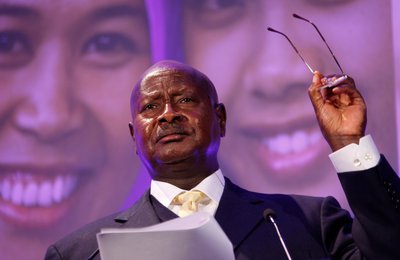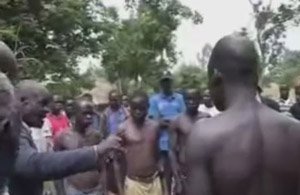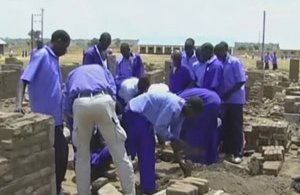The Uganda Joint Christian Council (UJCC), a local inter-faith peacebuilding organisation in Uganda had called the Electoral Commission (EC) to move quickly and release the Voters register to harness credibility and demonstrate its readiness to organise a free, fair and peaceful elections. In his appeal to the Chairman of the EC, UJCC Executive Secretary, the Rev. Fr. Dr. Silverster Arinaitwe Rwomukubwe called for the postponement of nomination of presidential candidates which ended on Tuesday, October 26.
In a statement to the media, Rev. Arinatwe said; “A clean national voters register is a vital tool for ensuring a smooth and efficient nomination exercise in all public elections” (See Daily Monitor, Monday October 25, 2010). Uganda holds crucial elections early next year but many people fear it might turn violent and plunge the country into a “Kenya-like” situation if the international community does not act. On October 6, 2010 Ms Margaret Sekagye, the former Chairperson of the Uganda Human Rights Commission, and the current UN Special Rapporteur on the situation of Human Rights Defenders, launched a new report very critical of the Ugandan Electoral Commission for its unpreparedness and “failure to address constant harassment, arrest and intimidations which political groups and some individuals are subjected to by the police and Kiboko squads.”
Ms Sekaggye said there is need for dialogue among the political players to avoid a scenario of the violence as it was in Kenya after the 2007 presidential elections. She called for a provision in the law to ban individuals found guilty by courts of law of electoral offences. The “Kiboko squad” is the local term for “a group of stick welding youths” allegedly sponsored by state agents to beat up opposition groups and their supporters and disperse their rallies. The first featured on Ugandan stage during the 2001 presidential election as part of Kalangala Action Plan, KAP, a paramilitary group led by Maj. Kakoza Mutale to intimidate and coerce rural voters to vote for the incumbent Museveni at the time. Over the years, the Kiboko Squad have been operating freely, alongside the Police Force in most urban centres, and on Kampala streets to disperse any kind of public demonstration and opposition rallies.
Last year, national television broadcast live coverage and pictures of the Kiboko squad beating opposition politicians and their supporters, while police stood and watched, creating fears in many Ugandans that the country had degenerated into utter chaos. The police deny control over this group, and yet they often emerge from police stations (See “Police wants Kiboko Squad team arrested”, Daily Monitor October 27, 2010). But surely, someone must know who owns these marauding youths: because the last time when the Kiboko beat up opposition supporters, the president appeared on television to applaud them for “maintaining public order”. Retired Supreme Court Justice George Kanyeihamba, who was a key note speaker at the launch of the abovementioned Sekaggye report, reiterated her concern that “under current conditions, it will be improbable to organise free and fair elections come 2011.” He said “no substantial reforms have been conducted. The ground is not level. Candidates like President Museveni have unfair advantage...”
Presidential nominations closed on Tuesday October 26, 2010 out of the 53 original candidates, eight presidential candidates were nominated: President Museveni, Dr Kizza Besigye, Mr. Norbert Mao, Mr. Jaberi Bidandi Ssali, Ms Beti Olive Kamya, Dr Abed Bwanika, Mr. Olara Otunnu and Mr. Samuel Lubega. Apart from a few comedians- who picked the forms for comedy’s sake, some vying contestants were presumably kept out by the stringent requirements of 100 signatures from 75 districts and 8 million shillings nomination fee, within a very tight nomination dateline. The nomination exercises were largely peaceful and huge crowds followed each presidential candidate to hear their programme for the nation. Day one of the campaigns however kicked off with voter scepticism over the possibility of any free and fair elections, or whether Museveni is in fact prepared for any result that does not favour him. According to UJCC, “in order to meet the electoral challenges, the Electoral Commission needs to urgently address the issues of publication of the national voters register which, as far as we are aware, had not been published by Friday, 22 October, 2010, following the voters register and display exercises.”
The Electoral Commission going forward faces enormous huddles to convince weary Ugandans that it can deliver free, fair and peaceful elections early next year. Many Ugandans are down to their knees praying (See Uganda: a nation in prayer as electioneering kicks off), but it’s also a biblical truth that God helps those who help themselves. Therefore local religious peace builders like UJCC are only reminding the Electoral Commission that its prayers for peaceful elections will not guarantee peaceful elections unless more is done in terms of transparency and readiness. UJCC had requested that “aspiring candidates should be given adequate time to consult and re-submit the names of their supporters.” And that “this can only be done if more time is given and all relevant information, based on the updated voters register, are availed to the candidates by the Commission.”
Justice Kanyeihamba also alluded to recommendations of some justices of the Supreme Court in 2006 and their advice to the current head of the EC, Eng. Dr Badru Kiggundu to ask President Museveni to reform the electoral processes or resign if his request was ignored. Reforms have not happened, and neither has he resigned.
The eight presidential candidates now embark on a three months nation-wide campaign rallying voters: an exercise marked by state intimidation and brutality in the past elections. And on 18 February 2011 Ugandans- God willing - will head to the polls to vote a new president.
Stephen Oola, Uganda Local Correspondent. 28 October 2010






